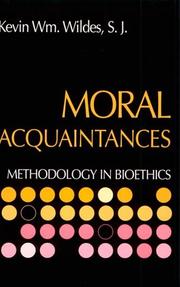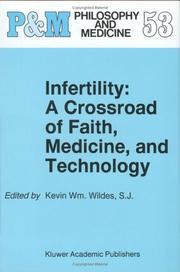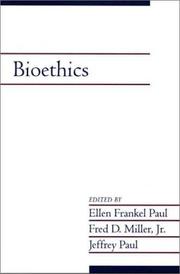| Listing 1 - 8 of 8 |
Sort by
|

ISBN: 0268034524 0268034508 Year: 2000 Publisher: Notre Dame University of Notre Dame
Abstract | Keywords | Export | Availability | Bookmark
 Loading...
Loading...Choose an application
- Reference Manager
- EndNote
- RefWorks (Direct export to RefWorks)
From decisions about the end of life to choices about the creation of life and, more recently, questions concerning the cost and accessibility of health care, bioethics is a field characterized by vigorous and sometimes rancorous public debate. Indeed, the moral controversies and dilemmas of medicine and health care often propel bioethics into newspaper headlines and onto television talk shows. Wildes does not focus on moral reactions to controversy, but rather on how we conceive of and define the controversy, and then how we seek a moral course of action. He argues that the methodological issues in bioethics mirror the experience of moral pluralism in a secular society. The different methods that have been used in the field reflect the different moral views found in a pluralistic society. Rather than assume that there is only one method for all or that we are lost in moral pluralism, Wildes argues that we can imagine ourselves instead as moral acquaintances. The key to understanding this acquaintanceship is to understand the procedures that bind us together plus the moral justifications of and assumptions for those procedures.
#GBIB:CBMER --- Bioethics --- Medical ethics --- Biomedical ethics --- Clinical ethics --- Ethics, Medical --- Health care ethics --- Medical care --- Medicine --- Biology --- Life sciences --- Life sciences ethics --- Methodology --- Moral and ethical aspects --- Professional ethics --- Nursing ethics --- Social medicine --- Science

ISBN: 0792340612 9401066051 9400902697 Year: 1996 Volume: 53 Publisher: Boston Kluwer Academic Publishers
Abstract | Keywords | Export | Availability | Bookmark
 Loading...
Loading...Choose an application
- Reference Manager
- EndNote
- RefWorks (Direct export to RefWorks)
Infertility: A Crossroad of Faith, Medicine, and Technology brings together a diverse group of clinicians, theologians, and philosophers to examine the use of reproductive technologies in the light of the Roman Catholic moral tradition and recent teaching. The book provides relevant background information (e.g. Donum Vitae from the Congregation for the Doctrine of the Faith) as it explores the psychological, social, legal, and moral contexts of reproductive medicine. This book is Volume 3 of Catholic Studies in Bioethics in the series Philosophy and Medicine.
-reproductieve technologie (voortplantingstechnologie, medisch begeleide voortplanting, MBV, artificiële voortplanting, kunstmatige voortplanting) --- technique de reproduction (technique de procréation, procréation médicalement assistée, PMA, assistance médicale à la procréation, AMP, procréation artificielle) --- fécondation in vitro (fertilisation in vitro, FIV, FIVETE) --- Human reproductive technology --- Infertility --- in-vitrofertilisatie (bevruchting in vitro, proefbuisbaby's) --- moraal en ethiek --- psychologie (psychologische aspecten) --- reproductieve technologie (voortplantingstechnologie, medisch begeleide voortplanting, MBV, artificiële voortplanting, kunstmatige voortplanting) --- theologie (theologische aspecten) --- Involuntary childlessness --- Sterility --- Sterility in humans --- Childlessness --- Generative organs --- Fertility, Human --- Sterilization (Birth control) --- Assisted human reproduction --- Assisted conception --- Conception --- Human assisted reproduction --- Human reproduction --- Medical technology --- Reproductive technology --- Religious aspects&delete& --- Catholic Church --- morale et éthique --- psychologie (aspects psychologiques) --- théologie (aspects théologiques) --- Diseases --- Technological innovations --- Doctrines. --- Religious aspects --- Catholic Church. --- Doctrines --- Infertility - Religious aspects - Catholic Church. --- Human reproductive technology - Religious aspects - Catholic Church. --- Assisted human reproductive technology --- Human assisted reproductive technology --- Ethics. --- Medical ethics. --- Religion. --- Theory of Medicine/Bioethics. --- Religious Studies, general. --- Religion, Primitive --- Atheism --- Irreligion --- Religions --- Theology --- Biomedical ethics --- Clinical ethics --- Ethics, Medical --- Health care ethics --- Medical care --- Medicine --- Bioethics --- Professional ethics --- Nursing ethics --- Social medicine --- Deontology --- Ethics, Primitive --- Ethology --- Moral philosophy --- Morality --- Morals --- Philosophy, Moral --- Science, Moral --- Philosophy --- Values --- Moral and ethical aspects --- Church of Rome --- Roman Catholic Church --- Katholische Kirche --- Katolyt︠s︡ʹka t︠s︡erkva --- Römisch-Katholische Kirche --- Römische Kirche --- Ecclesia Catholica --- Eglise catholique --- Eglise catholique-romaine --- Katolicheskai︠a︡ t︠s︡erkovʹ --- Chiesa cattolica --- Iglesia Católica --- Kościół Katolicki --- Katolicki Kościół --- Kościół Rzymskokatolicki --- Nihon Katorikku Kyōkai --- Katholikē Ekklēsia --- Gereja Katolik --- Kenesiyah ha-Ḳatolit --- Kanisa Katoliki --- כנסיה הקתולית --- כנסייה הקתולית --- 가톨릭교 --- 천주교
Book
ISBN: 3031390970 3031390962 Year: 2023 Publisher: Cham, Switzerland : Springer,
Abstract | Keywords | Export | Availability | Bookmark
 Loading...
Loading...Choose an application
- Reference Manager
- EndNote
- RefWorks (Direct export to RefWorks)
This book explores an undeveloped area in postmodern thought: organizational ethics. Ethical debates and analysis usually focus on a particular act or action, an actor, and/or how a secular society should address any of those particular persons or events. In the Post Modern age, ethical decisions and policies are characterized by moral and cultural pluralism. However, there is a second factor that complicates ethical and policy decisions even further. This book argues that in the postmodern age ethical decisions often need to be understood as part of the decision making of organizations and bureaucracies. Organizational decisions often have direct bearing on the choices made by individuals. Two areas that exemplify postmodern issue are the areas of health care and education. For example the decision making of Admissions Officers in American higher education, are influenced by decisions that have been made by the university about the size of the class and the diversity of the class. Health Care organizations make policy decisions that affect every aspect of a patient’s care from admission to treatment and the types of care that are or are not offered. Both education and health care are the object of the significant investment of resources, both areas are value laden in postmodern, pluralistic societies, and yet we do not have a comprehensive method to understand them or evaluate them. This book is of interest to bioethicists, physicians, nurses, health care policy students, educational policy experts, students and government regulators.
Ethics. --- Medical policy. --- Business ethics. --- Moral Philosophy and Applied Ethics. --- Health Policy. --- Business Ethics. --- Business --- Businesspeople --- Commercial ethics --- Corporate ethics --- Corporation ethics --- Professional ethics --- Wealth --- Health care policy --- Health policy --- Medical care --- Medicine and state --- Policy, Medical --- Public health --- Public health policy --- State and medicine --- Science and state --- Social policy --- Deontology --- Ethics, Primitive --- Ethology --- Moral philosophy --- Morality --- Morals --- Philosophy, Moral --- Science, Moral --- Philosophy --- Values --- Moral and ethical aspects --- Government policy --- Organizational behavior --- Moral and ethical aspects.
Book
Year: 1994 Publisher: Dordrecht Kluwer
Abstract | Keywords | Export | Availability | Bookmark
 Loading...
Loading...Choose an application
- Reference Manager
- EndNote
- RefWorks (Direct export to RefWorks)
Book
ISBN: 9781402031564 Year: 2005 Publisher: Dordrecht Springer Netherlands
Abstract | Keywords | Export | Availability | Bookmark
 Loading...
Loading...Choose an application
- Reference Manager
- EndNote
- RefWorks (Direct export to RefWorks)
The Edge of Life: Human Dignity and Contemporary Bioethics resituates bioethics in fundamental outlook by challenging both the dominant Kantian and utilitarian approaches to evaluating how new technologies apply to human life. Drawing on an analysis of the dignity of the human person, both as an agent and as the recipient of action, The Edge of Life presents a "theoretical" approach to the problems of contemporary bioethics and applies this approach to various disputed questions. Should conjoined twins be split, if the division will end the life of the weaker twin? Was Bush's stem cell research decision morally acceptable? Are the 'quality of life' and 'sanctity of life' ethics irreconcilably incompatible? Accessible to both scholars and students, The Edge of Life focuses particularly on the controversial issues surrounding the beginning and ending of human life, tackling some of the toughest practical questions of bioethics including new reproductive technologies (artificial wombs), stem cell research, abortion and physician assisted suicide, as well as many of its vexing theoretical disputes.
Professional ethics. Deontology --- General ethics --- History of human medicine --- Hygiene. Public health. Protection --- ethiek --- filosofie --- geneeskunde --- gezondheidszorg --- deontologie
Digital
ISBN: 9781402031564 Year: 2005 Publisher: Dordrecht Springer
Abstract | Keywords | Export | Availability | Bookmark
 Loading...
Loading...Choose an application
- Reference Manager
- EndNote
- RefWorks (Direct export to RefWorks)
Professional ethics. Deontology --- General ethics --- History of human medicine --- Hygiene. Public health. Protection --- ethiek --- filosofie --- geneeskunde --- gezondheidszorg --- deontologie


ISBN: 0521525268 Year: 2002 Publisher: Cambridge Cambridge university press
Abstract | Keywords | Export | Availability | Bookmark
 Loading...
Loading...Choose an application
- Reference Manager
- EndNote
- RefWorks (Direct export to RefWorks)
Technological innovations and social developments have led to dramatic changes in the practice of medicine and in the way that scientists conduct medical research. Change has brought beneficial consequences, yet these gains have come at a cost, for many modern medical practices raise troubling ethical questions: Should life be sustained mechanically when the brain's functions have ceased? Should potential parents be permitted to manipulate the genetic characteristics of their embryos? Should society ration medical care to control costs? Should fetal stem cells be experimented upon in an effort to eventually palliate or cure debilitating diseases? Bioethicists analyze and assess moral dilemmas raised by medical research and innovative treatments; they also counsel healthcare practitioners, patients, and their families. In this anthology, fifteen philosophers, social scientists, and academic lawyers assess various aspects of this field.


ISBN: 0878406468 Year: 1997 Publisher: Washington Georgetown university press
Abstract | Keywords | Export | Availability | Bookmark
 Loading...
Loading...Choose an application
- Reference Manager
- EndNote
- RefWorks (Direct export to RefWorks)
"Evangelium Vitae", or "The Gospel of Life", Pope John Paul II's 1995 encyclical, addresses practical moral questions that touch on the sacredness of human life: abortion, euthanasia and assisted suicide, and capital punishment. Tackling major moral and cultural ideas, the Pope urged "all men and women of good will" to embrace a "culture of life" instead of the prevailing "culture of death". In this book, scholars from a wide range of disciplines - law, medicine, philosophy, and theology - and various religious perspectives discuss and interpret the Pope's teachings on these complex moral issues. The opening essays establish a context for the encyclical in the moral thought of John Paul II and examine issues of methodology and ecclesiology. A second group considers the themes of law and technology, which are crucial to the way the encyclical views the specific matters of life and death. The final section turns to the specific topics of abortion, euthanasia, assisted suicide, medical experimentation, and capital punishment. Seeking to promote discussion between the ideas of the encyclical and other points of view, this volume does not attempt to endorse "Evangelium Vitae" but rather to illustrate its relevance to both private choice and public policy. It will serve as a foundation for further dialogue and allow others to approach the pontiff's thought with new awareness and insight.
Abortion --- Capital punishment --- Euthanasia --- Religious aspects --- Catholic Church --- Catholic Church. --- Doctrines.
| Listing 1 - 8 of 8 |
Sort by
|

 Search
Search Feedback
Feedback About UniCat
About UniCat  Help
Help News
News